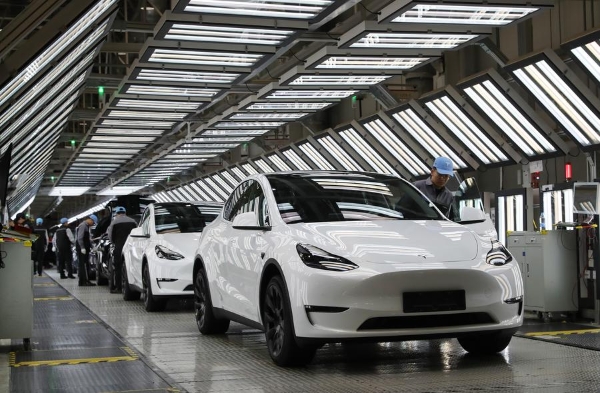
 0 Comment(s)
0 Comment(s) Print
Print E-mail Xinhua, March 24, 2025
E-mail Xinhua, March 24, 2025

Employees work at Tesla's Shanghai Gigafactory in east China's Shanghai, Dec. 22, 2023. [Photo/Xinhua]
As millions of Chinese consumers trade in their devices for the latest models ranging from electric vehicles to home appliances, the rising consumer spending has benefited both Chinese and foreign brands.
China kicked off large-scale equipment upgrade and consumer goods trade-in programs in March 2024, and revamped these programs earlier this year, amid efforts to boost domestic demand and spur economic growth.
Prominent foreign brand, Tesla, has benefited from such programs in the sale of its revised Model Y.
Earlier this month, on the first day of deliveries of the revised Model Y in east China's Shanghai, more than 500 new vehicles were handed over to buyers, many of whom took advantage of China's trade-in scheme.
A resident in Shanghai surnamed Zhang, mentioned that by trading in his old gasoline car and taking advantage of consumption subsidies, he was able to purchase a revised Model Y for about 200,000 yuan (approximately $27,863). "The incentives from these subsidy programs are quite significant, which motivated me to place the order," he said.
Subsidies vary from place to place. In Guangdong Province in south China, for instance, consumers who buy new energy vehicles can receive subsidies of up to 20,000 yuan.
Notably, apart from the government's stimulus policy, Tesla has also taken steps to provide various car purchase incentives, including interest-free financing and insurance subsidy programs, to further lower costs for its customers.
Foreign firms in the home appliance sector have also benefited from the government program. "The Chinese government's consumption stimulus policies, including the trade-in program, have increased consumer spending. As a result, sales in Panasonic's home appliance segment have grown," Lin Yibin, managing officer of China & Northeast Asia Company of Panasonic Appliances (China) Co., Ltd, told Xinhua in an interview.
Following the introduction of these policies, sales of Panasonic's large home appliances from September to December last year, such as washing machines and refrigerators, especially in the offline market, have surpassed figures from the same period of 2023, Lin added.
In early January this year, China announced a raft of measures to expand the scope of its consumer goods trade-in program. Under the expanded program, categories of home appliances eligible for government subsidies have been increased from eight in 2024 to 12 in 2025.
"The revamped policy has sparked a surge in consumer spending on home appliances across the country. We are actively working with all parties to benefit from the new policy," Lin noted.
These subsidies have helped bring more coffee machines into Chinese homes. In places like Shanghai, Shenzhen and Hubei Province, coffee machines have been added to the list of items eligible for subsidies. De'Longhi, an Italian coffee machine supplier, has benefited from this initiative.
"Last year, we saw double-digit growth, and since January of this year, we've maintained an even higher double-digit growth rate -- largely thanks to the consumption stimulus policies," said Zong Yanping, managing director of De'Longhi Greater China, in an interview with Xinhua.
"Unlike large home appliances, which have long been essential in Chinese households, coffee machines are still relatively new to many families. Therefore, the purchasing subsidies have been very helpful for us in terms of marketing," Zong explained.
Zong is optimistic about China's market potential, as the consumption stimulus coincided with a shift in coffee-drinking habits in the country, noting that "what began as an occasional social activity has become a morning routine for many young people today."
China's large-scale equipment upgrade and consumer goods trade-in programs have so far yielded fruitful results. In 2024, it drove equipment purchases and investment up by 15.7% -- contributing 67.6% to overall investment growth while boosting sales of bulk durable consumer goods by over 1.3 trillion yuan last year, according to data released by the National Development and Reform Commission in February.
Vowing to make domestic demand "the main engine and anchor of economic growth," China's policymakers during this year's "two sessions" sent fresh and firm signals regarding empowering the country's vast number of consumers to spend more confidently.
Following the 2025 "two sessions," China vowed to implement solid support measures to connect consumer spending to people's well-being in the latest consumption-promotion plan. The plan outlines the issuance of ultra-long special treasury bonds totaling 300 billion yuan to bolster consumer goods trade-in programs in 2025 -- doubling the 2024 figure.